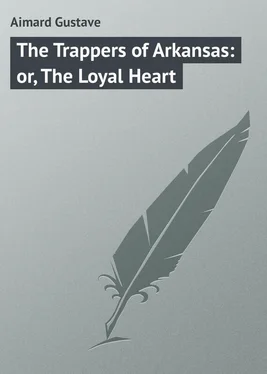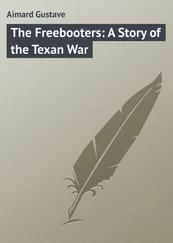Gustave Aimard - The Trappers of Arkansas - or, The Loyal Heart
Здесь есть возможность читать онлайн «Gustave Aimard - The Trappers of Arkansas - or, The Loyal Heart» — ознакомительный отрывок электронной книги совершенно бесплатно, а после прочтения отрывка купить полную версию. В некоторых случаях можно слушать аудио, скачать через торрент в формате fb2 и присутствует краткое содержание. Жанр: foreign_prose, foreign_adventure, на английском языке. Описание произведения, (предисловие) а так же отзывы посетителей доступны на портале библиотеки ЛибКат.
- Название:The Trappers of Arkansas: or, The Loyal Heart
- Автор:
- Жанр:
- Год:неизвестен
- ISBN:нет данных
- Рейтинг книги:3 / 5. Голосов: 1
-
Избранное:Добавить в избранное
- Отзывы:
-
Ваша оценка:
- 60
- 1
- 2
- 3
- 4
- 5
The Trappers of Arkansas: or, The Loyal Heart: краткое содержание, описание и аннотация
Предлагаем к чтению аннотацию, описание, краткое содержание или предисловие (зависит от того, что написал сам автор книги «The Trappers of Arkansas: or, The Loyal Heart»). Если вы не нашли необходимую информацию о книге — напишите в комментариях, мы постараемся отыскать её.
The Trappers of Arkansas: or, The Loyal Heart — читать онлайн ознакомительный отрывок
Ниже представлен текст книги, разбитый по страницам. Система сохранения места последней прочитанной страницы, позволяет с удобством читать онлайн бесплатно книгу «The Trappers of Arkansas: or, The Loyal Heart», без необходимости каждый раз заново искать на чём Вы остановились. Поставьте закладку, и сможете в любой момент перейти на страницу, на которой закончили чтение.
Интервал:
Закладка:
As for Don Ramón, always good and anxious for his wife, whom he had never taken the pains to study, he had a right to believe her the happiest creature in the world, which, in fact, she became as soon as God made her a mother.
It was some minutes after sunset; the sky, by degrees, lost its purple tint, and grew rapidly darker; a few stars began to sparkle in the celestial vault, and the evening wind arose with a force that presaged for the night, one of those terrible storms which so often burst over these regions of the sun.
The mayoral, after having caused the rest of the ganado to be carefully shut up in the enclosure, assembled the vaqueros and the peons, and all directed their steps towards the hacienda, where the supper bell announced to them that the hour of rest was at length arrived.
As the major-domo passed the last, with a bow, before his master, the latter asked him:
"Well, Nô Eusebio, how many heads do we count this year?"
"Four hundred and fifty mi amo – my master," replied the mayoral, a tall, thin, wizened man, with a grayish head, and a countenance tanned like a piece of leather, stopping his horse and taking off his hat; "that is to say, seventy-five head more than last year. Our neighbours the jaguars and the Apaches have not done us any great damage this season."
"Thanks to you, Nô Eusebio," Don Ramón replied; "your vigilance has been great; I must find means to recompense you for it."
"My best recompense is the kind remark your lordship has just addressed to me," the mayoral, whose rough visage was lit up by a smile of satisfaction, replied. "Ought I not to watch over everything that belongs to you with the same zeal as if it were my own?"
"Thanks," the gentleman remarked with emotion, and shook his servant's hand. "I know how truly you are devoted to me.
"For life and to death, my master! My mother nourished you with her milk; I belong to you and your family."
"Come, come, Nô Eusebio," the hacendero said, gaily; "supper is ready; the señora is by this time at table; we must not keep her waiting."
Upon this, both entered the patio, and Nô Eusebio, as Don Ramón had named him, prepared, as was his custom every evening, to close the gates.
In the meantime, Don Ramón entered the dining hall of the hacienda, where all the vaqueros and peons were assembled.
This hall was furnished with an immense table, which occupied the entire centre; around this table there were wooden forms covered with leather, and two carved armchairs, intended for Don Ramón and the señora. Behind these chairs, an ivory crucifix, four feet high, hung against the wall, between two pictures, representing, the one, "Jesus in the Garden of Olives," the other the "Sermon on the Mount." Here and there, on the whitewashed walls, grinned the heads of jaguars, buffaloes, and elks, killed in the chase by the hacendero.
The table was abundantly supplied with lahua, or thick soup made of the flour of maize boiled with meat, with puchero, or olla podrida, and with pepian; at regular distances there were bottles of mezcal, and decanters of water.
At a sign from the hacendero the repast commenced.
The storm, which had threatened for some time past, now broke forth with fury.
The rain fell in torrents; at every second vivid flashes of lightning dimmed the lights of the hall, preceding awful claps of thunder.
Towards the end of the repast, the hurricane acquired such violence, that the tumult of the conspiring elements drowned the hum of conversation.
The thunder peals clashed with frightful force, a whirlwind filled the hall, after dashing in a window, and extinguished all the lights; the assembly crossed themselves with terror.
At that moment, the bell placed at the gate of the hacienda resounded with a convulsive noise, and a voice, which had nothing human in it, cried twice distinctly, —
"Help! help!"
"Sangre de Cristo!" Don Ramón cried, as he rushed out of the hall, "somebody is being murdered on the plain."
Two pistol shots resounded at almost the same moment, a cry of agony rung through the air, and all relapsed into sinister darkness.
All at once, a pale flash of lightning furrowed the obscurity, the thunder burst with a horrible crash, and Don Ramón reappeared in the hall, bearing a fainting man in his arms.
The stranger was placed in a seat, and all crowded round him.
There was nothing extraordinary in either the countenance or the appearance of this man, and yet, on perceiving him, Rafaël, the eldest son of Don Ramón, could not repress a gesture of terror, and his face became lividly pale.
"O!" he murmured, in a low voice, "it is the juez de letras!"
It was, indeed, the worthy judge, whom we saw leave Hermosillo with such a brilliant equipage.
His long hair, soaked with rain, fell upon his breast, his clothes were in disorder, spotted with blood, and torn in many places.
His right hand convulsively clasped the stock of a discharged pistol.
Don Ramón had likewise recognized the juez de letras, and had unconsciously darted a glance at his son, which the latter could not support.
Thanks to the intelligent care that was bestowed upon him by Doña Jesuita and her women, he breathed a deep sigh, opened his haggard eyes, which he rolled round upon the assembly, without at first seeing anything, and by degrees recovered his senses.
All at once a deep flush covered his brow, which had been so pale a minute before, and his eye sparkled. Directing a look towards Don Rafaël which nailed him to the floor, a prey to invincible terror, he rose painfully, and advancing towards the young man, who saw his approach without daring to seek to avoid him, he placed his hand roughly on his shoulder, and turning towards the peons, who were terrified at this strange scene, of which they comprehended nothing, he said solemnly, —
"I, Don Inigo Tormentes Albaceyte, juez de letras of the city of Hermosillo, arrest this man, accused of assassination, in the king's name!"
"Mercy!" cried Rafaël, falling on his knees, and clasping his hands with despair.
"Woe! woe!" the poor mother exclaimed, as she sank back fainting in her chair.
CHAPTER III.
THE SENTENCE
On the morrow the sun rose splendidly on the horizon. The storm of the night had completely cleared the sky, which was one of deep blue; the birds warbled gaily, concealed beneath the leaves, and all nature seemed to have resumed its accustomed festive air.
The bell sounded joyously at the Hacienda del Milagro; the peons began to disperse in all directions, some leading horses to the pasturage, others driving cattle to the artificial prairies, others again wending their way to the fields, whilst the rest were employed in the patio in milking the cows and repairing the damages done by the hurricane.
The only traces left of the tempest of the preceding night were two magnificent jaguars stretched dead before the gate of the hacienda, not far from the carcass of a half-devoured horse.
Nô Eusebio, who was walking about in the patio, carefully overlooking the occupations of all, ordered the rich trappings of the horse to be taken off and cleaned, and the jaguars to be skinned; all of which was done in the shortest time possible.
Nô Eusebio was, however, very uneasy; Don Ramón, generally the first person stirring in the hacienda, had not yet appeared.
On the preceding evening, after the terrible accusation brought by the juez de letras against the eldest son of the hacendero, the latter had ordered his servants to retire, and after having himself, in spite of the tears and prayers of his wife, firmly bound his son, he led Don Inigo Albaceyte into a retired apartment of the farm, where they both remained in private till a far advanced hour of the night.
Читать дальшеИнтервал:
Закладка:
Похожие книги на «The Trappers of Arkansas: or, The Loyal Heart»
Представляем Вашему вниманию похожие книги на «The Trappers of Arkansas: or, The Loyal Heart» списком для выбора. Мы отобрали схожую по названию и смыслу литературу в надежде предоставить читателям больше вариантов отыскать новые, интересные, ещё непрочитанные произведения.
Обсуждение, отзывы о книге «The Trappers of Arkansas: or, The Loyal Heart» и просто собственные мнения читателей. Оставьте ваши комментарии, напишите, что Вы думаете о произведении, его смысле или главных героях. Укажите что конкретно понравилось, а что нет, и почему Вы так считаете.












